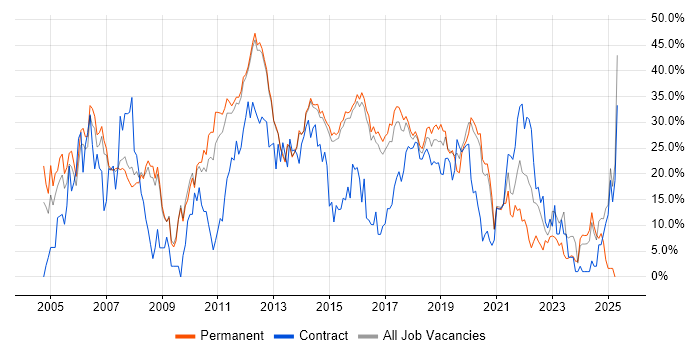SQL (Structured Query Language)
Surrey > Reigate
The table below provides summary statistics and salary benchmarking for jobs advertised in Reigate requiring SQL skills. It covers permanent job vacancies from the 6 months leading up to 1 January 2026, with comparisons to the same periods in the previous two years.
|
|
6 months to
1 Jan 2026 |
Same period 2025 |
Same period 2024 |
| Rank |
13 |
13 |
14 |
| Rank change year-on-year |
0 |
+1 |
+11 |
| Permanent jobs citing SQL |
3 |
6 |
1 |
| As % of all permanent jobs in Reigate |
3.13% |
11.76% |
2.33% |
| As % of the Programming Languages category |
25.00% |
30.00% |
7.69% |
| Number of salaries quoted |
0 |
3 |
0 |
| Median annual salary (50th Percentile) |
- |
£37,170 |
- |
| Surrey median annual salary |
£50,000 |
£62,500 |
£52,500 |
| % change year-on-year |
-20.00% |
+19.05% |
- |
SQL falls under the Programming Languages category. For comparison with the information above, the following table provides summary statistics for all permanent job vacancies requiring coding skills in Reigate.
| Permanent vacancies with a requirement for coding skills |
12 |
20 |
13 |
| As % of all permanent jobs advertised in Reigate |
12.50% |
39.22% |
30.23% |
| Number of salaries quoted |
9 |
9 |
9 |
| 10th Percentile |
£34,500 |
- |
£58,400 |
| 25th Percentile |
£36,250 |
£35,105 |
£62,500 |
| Median annual salary (50th Percentile) |
£37,500 |
£77,500 |
£65,000 |
| Median % change year-on-year |
-51.61% |
+19.23% |
-16.13% |
| 75th Percentile |
£85,000 |
£82,500 |
£67,500 |
| 90th Percentile |
£87,000 |
£85,000 |
£73,500 |
| Surrey median annual salary |
£51,750 |
£65,000 |
£54,500 |
| % change year-on-year |
-20.38% |
+19.27% |
-5.22% |
SQL
Job Vacancy Trend in Reigate
Historical trend showing the proportion of permanent IT job postings citing SQL relative to all permanent IT jobs advertised in Reigate.
SQL
Salary Trend in Reigate
Salary distribution trend for jobs in Reigate citing SQL.
SQL
Co-Occurring Skills & Capabilities in Reigate by Category
The following tables expand on the one above by listing co-occurrences grouped by category. They cover the same employment type, locality and period, with up to 20 co-occurrences shown in each category:


